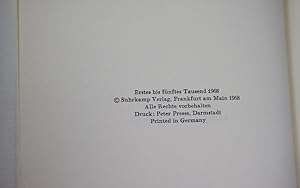

Pierre Joris's translation was reviewed in Publishers Weekly in 2000: " Threadsuns represents the continuation of a marked turn in Celan's poetics-away from lusher effusions to intensely compressed, increasingly stark investigations of language, history and the poet's own capacities. It was published in English in its entirety in 2000, though parts of it had appeared earlier in volumes of selected poems.

It has been translated by Pierre Joris as Threadsuns, and by others as Twinesuns and Fathomsuns. This way, the poems are trying to save Eros (in the sense of creaturely love) from being mutilated by the crimes of European history while at the same time aiming at rehabilitating mankind in a post-holocaust world.Fadensonnen is a 1968 German-language poetry collection by Paul Celan. Celan's poems act as a catalyst, for they exclude god from the spheres of man, making poetry a memorial site to the dead and the ones living in pain. In this ahistorical sphere there is no room for a god that permitted the holocaust, redefining mysticism as the connection between men instead of one between man and god. Within this space of encounter, only the reminiscence of body and sexuality exists, commemorating the other, so that radical corporeality seems to be the prerequisite for togetherness. In this way, the poems' inherent pain and misery transform the reader into a nobody, for only a nobody has got the prerequisites to encounter other people unbiasedly in their unique wholeness. With this in mind, the modus operandi of his poems is that of a butcher: Whatever has previously been alive – before the Shoah – now has to be stripped bare of its layers of individual and collective history, has to become less than body and flesh.

Despite these two objections, Celan's poems address the struggle of togetherness in a world that negates the mere possibility of otherness, trying to salvage the unique identity and dignity of the other. Secondly, in the aftermath of the holocaust, the idea of man wanting to merge with a god that had not prevented this cruelty from happening had lost much of its plausibility. Firstly, the European philosophy of existence, especially with its proponents Jean-Paul Sartre, Albert Camus and Martin Heidegger, had gone to great lengths to criticize and delegitimize the Abrahametic religions, for the concept of god seemed to be an obstacle to humanity in pursuit of its own humanization. In his 1968 poetry collection „Fadensonnen“, Paul Celan offers a hermetic blend of existentialism and mysticism, which is unusual in two respects.


 0 kommentar(er)
0 kommentar(er)
